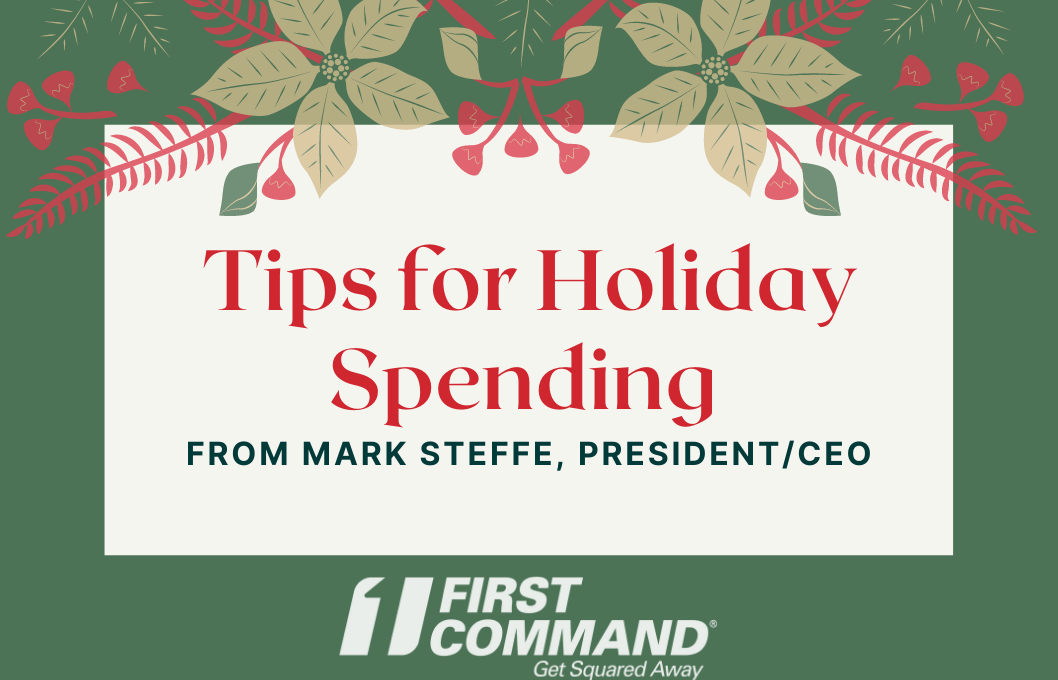No matter how you celebrate the holidays, you undoubtedly think of it as a special time of year.
There are so many festive activities that mark the season: parties, home decorating, baking, watching classic holiday movies, taking time off from work and school to enjoy the company of friends, and big family gatherings with all the traditions that go with them. The holiday season is also a time to reflect on the year gone by, re-energize by connecting with loved ones, and make plans for the year ahead.
Due to the pandemic, many typical holiday activities are not feasible this year.
Gift giving, in particular, will be different. More gifts will be mailed and opened remotely rather than in person. And it’s natural to expect that holiday spending and gatherings will be scaled back. But with minor adjustments, you can preserve your gift-giving traditions while also being mindful of financial considerations.
 Start with a plan, using a “top-down” approach for your budget.
Start with a plan, using a “top-down” approach for your budget.
Most people shop from the “bottom-up,” meaning they start out without a master plan and think only about specific gifts for individual people. You have very little control of your budget this way because you end up with whatever the total expense ends up to be. And because you’ve already picked out the perfect gift for everyone by the time you realize you have overspent, it’s almost impossible to change course at that point.
Instead, try a “top-down” approach. Decide in advance how much you want to spend in total. Then make a list of everyone you plan to buy a gift for and set a target dollar amount for each person. Obviously, you don’t need to spend the same amount on every person. But by starting with the total budget in mind, you can set an appropriate range for each family member or friend. Then, select individual gifts that align with the targets you’ve set. Even if you do go over budget on one gift, you can strategically make it up elsewhere.
Look for deals.
Sign up for vendor emails so you can take advantage of sales and discounts. If you’re buying gifts for people you won’t be seeing in person, have the gifts shipped directly to avoid paying additional shipping costs.
Include a heartfelt message.
No matter how small the gift, a personal note highlights the importance of your relationship with the recipient, which ultimately is the purpose behind any gift.
Remember that gifts don’t have to be store-bought.
Homemade and handcrafted gifts can be budget-friendly alternatives. Personal gifts are often more appreciated because of the shared experience they represent. Here are some popular ideas to get you started:
- Gather family photos to create a memorable keepsake, or compile them into a slideshow for the family to watch together.
- Bake treats or use your crafting skills to create a personalized gift.
- Set aside a day to engage in favorite activities together, such as painting, playing board games, watching movies, singing karaoke, or even playing virtual trivia. Most of these activities can be done remotely if you aren’t able to gather in person with family and friends this year.
- Introduce your loved one to an activity that can take the place of those that aren’t happening now. Get creative with an online course or subscription, a new hobby or a puzzle.
Commit to the “pay now and enjoy later” principle.
Do not fall into the trap of deferring holiday expense payments into the new year. Whether it’s a purchase for yourself or a gift for a loved one, the pain you will feel from the lingering burden is sure to outweigh any pleasure you might get in the moment. Happiness research shows that if we’ve fulfilled the painful part of an experience (in this case, the payment) upfront, then we can actually enjoy the experience more fully. On the other hand, paying for purchase after the joy of receiving it wears off can lead to buyer’s remorse.
Spread the love.
If you are in a position to do so, consider giving to those in need. It’s been an especially difficult year, and there are more families than ever experiencing financial hardship. Giving to others contributes to our own sense of abundance and wellbeing, and these feelings of security have the power to enhance our own happiness.
Plan for a better tomorrow.
Every year is a chance to have a fresh start, and this year, in particular, we are all looking ahead to what we hope will be better days in 2021 with great anticipation. Don’t leave it to chance by hoping and wishing for things to get better – plan for it to happen by stacking the deck in your favor.
- Sit down with your family to make a budget. Account realistically for your family’s expenses, cutting back where you can, and include priorities such as saving for emergencies and investing for your financial goals. This should always be done with your spouse, and you can involve your children at whatever level is appropriate.
- Organize your financial documents. Gather important papers and passwords, and organize them in a way that makes sense for you. When everything is in one easily accessible location, you’ll feel more in control.
- Work with a Financial Advisor to create a financial plan. It’s empowering to know where you are in your financial life and what you need to do to pursue your goals. If you already have a plan, commit to updating it once a year. It’s motivating to see the progress you’ve made since getting started, and an update ensures that your plan is keeping up with the changes taking place in your life.
- If your family is one of the fortunate ones whose income has not been adversely affected by the pandemic, take a close look at your budget. It’s likely that you have excess cash on hand since most of us have decreased spending on things like entertainment, gas, dry cleaning, and travel this year. If this is the case, it can be tempting to splurge over the holidays. There’s nothing wrong with that – you should certainly treat yourself if you can. After all, it’s been a rough year all around. But consider making it a split gift, using some of it today, and the rest of it for your future self by strengthening your financial position. This could mean putting it aside in an emergency fund, using it to pay off high-interest debt, or investing it toward a long-term financial goal.
Even as we make adjustments to our holiday traditions and plans this year, celebrating the simple joys of the season is important to your and your family’s wellbeing.
If you want some help assessing and planning for your family’s financial health, we’re here for you. In fact, we provide complimentary financial plans for active duty service members and their families. Visit First Command and click on “Get Started” to find a financial coach near you. From our family to yours, we wish you a joyous holiday season.
 Mark Steffe is the President/CEO of First Command. Mark earned a Bachelor of Science degree in Finance from the University of Illinois, graduating with high honors. He holds series 7, 8, 23, 63, and 65 securities registrations, plus life and health insurance licenses.
Mark Steffe is the President/CEO of First Command. Mark earned a Bachelor of Science degree in Finance from the University of Illinois, graduating with high honors. He holds series 7, 8, 23, 63, and 65 securities registrations, plus life and health insurance licenses.
©2020 First Command Financial Services, Inc. parent of First Command Financial Planning, Inc. (Member SIPC, FINRA), First Command Advisory Services, Inc., First Command Insurance Services, Inc., and First Command Bank. Securities and brokerage services are offered by First Command Financial Planning, Inc., a broker-dealer. Financial planning and investment advisory services are offered by First Command Advisory Services, Inc., an investment adviser. Insurance products and services are offered by First Command Insurance Services, Inc. Banking products and services are offered by First Command Bank. Securities products are not FDIC insured, have no bank guarantee, and may lose value. A financial plan, by itself, cannot assure that retirement or other financial goals will be met.










